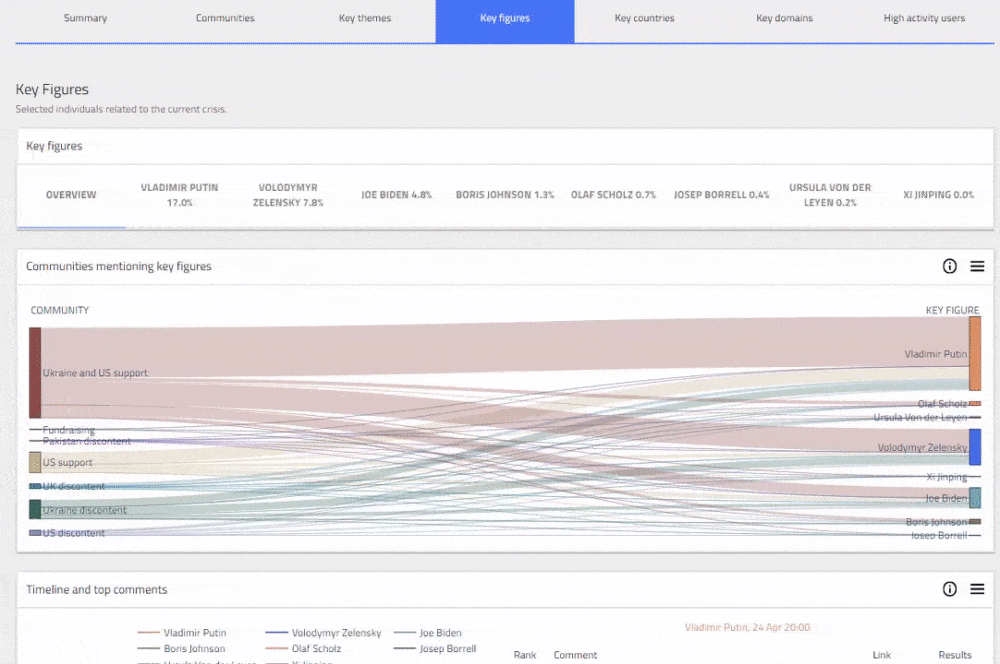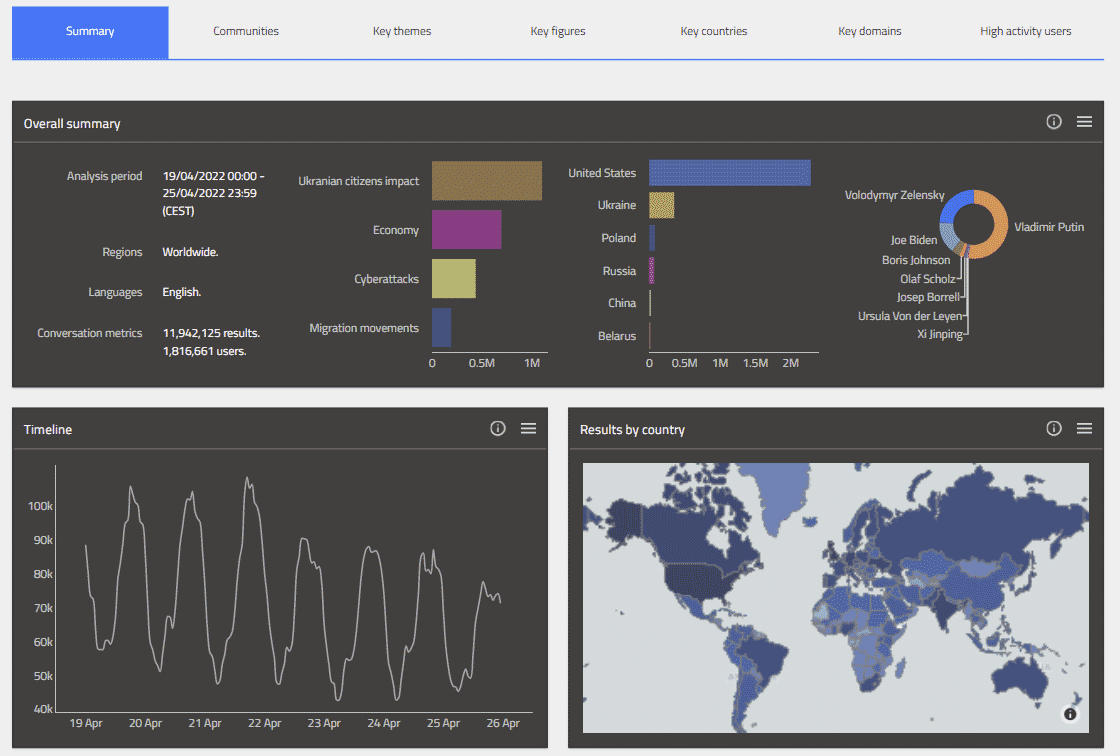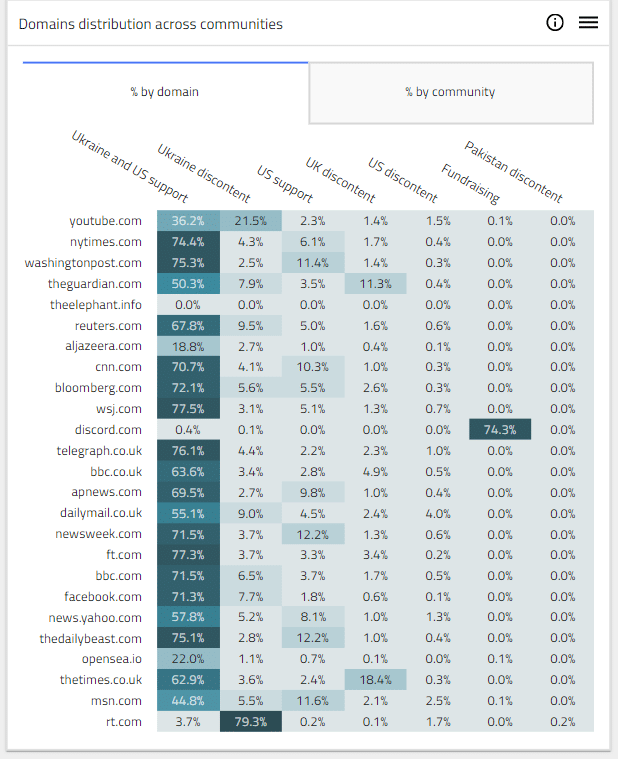Constella’s team of intelligence analysts created a custom, proprietary dashboard available through our Dome Platform, visualizing selected dimensions of the digital public conversation related to the Ukraine crisis to identify fast-moving global trends emerging from the online debate and to better understand the narratives and critical players driving the digital conversation. Each week, Constella Intelligence will share notable findings from its dashboard on the Constella Intelligence blog. Below are key insights from April 19th to 25th, 2022, from the digital public conversation related to Ukraine. Over the period analyzed, the dashboard captured 11,942,125 results generated by 1,816,661 users interacting in English.
KEY INSIGHTS – APRIL 19TH TO 25TH, 2022
1. Distribution of Russian media, Russia Today (RT), is highly concentrated in Zelensky-critical narratives
On March 2nd, the EU imposed sanctions on state-owned outlets Russia Today (RT) and Sputnik’s broadcasting in the EU. Nevertheless, in the global debate on the Ukraine conflict, RT remains a relevant domain in communities and conversations directly critical of Zelensky in addition to NATO and US allies, often being propagated along with unsubstantiated disinformation or conspiratorial claims. In terms of distribution across communities, RT is one of the most highly concentrated domains in the debate. Notably, 79.3% of RT’s distribution is in the Ukraine Discontent (#2) community, making it the second most-shared domain following YouTube. Moreover, official Russian diplomatic accounts are critical drivers of this content, including the Russian embassy in London and the Russian Ministry of Foreign Affairs
2. Specific, recurring anti-Ukraine narratives focus on undermining the Zelensky administration
Criticisms of Zelensky are widely disseminated within the Ukraine Discontent community, taking the form of several specific arguments aimed at discrediting Western narratives related to the conflict. The most commonly distributed commentary of this type in the period analyzed includes:
- Discontent with Zelensky being awarded the German “Media Prize for Freedom” after revoking broadcasting licenses for a number of pro-Russian news channels in February 2021. Several press freedom-related allegations circulate, many mentioning the disappearance of Chilean-American journalist, Gonzalo Lira López
- Connecting the defacement of a memorial dedicated to a Holocaust concentration camp and Soviet prisoners by Ukrainian refugees to Nazis
- Emphasizing the role of the neo-Nazi Azov Battalion in Ukraine
- Questioning Zelensky’s motives in requesting weapons rather than food, water, or medical supplies
3. A peak in mentions of Putin after the French election reflect the conflict’s global political impact
After news of Emanuel Macron’s victory in the French presidential elections, mentions of Vladimir Putin peaked on April 24th. Comments harshly criticize his far-right opponent, Marine Le Pen, for being a “Putin puppet” and proclaim the victory as one analogous to the current Ukraine/Western vs. Russia conflict. The electoral defeat of Slovenian Prime Minister Janez Janša is also celebrated. Users declare a victory over right-wing populism and proclaim that Putin is losing his political allies in Europe. The conflict also featured heavily in debates between U.S. Democrats and Republicans. This dimension of the conversation illustrates how the European and American political divide has become shaded by this regional conflict.
COMMUNITIES – APRIL 19TH TO 25TH, 2022
1. Ukraine and US Support (37% of users): Led by Ukrainian journalists and media, and to a lesser extent, foreigners entering Ukraine condemning the Russian army for crimes against humanity. Users disseminate Zelensky’s appeals for more aid.In this conversation, criticisms of Olaf Scholz emerge, accusing him of lying about the availability of arms to send to Ukraine.
2. Ukraine/International Discontent (11.7% of users): Journalists and media from different parts of the world, including the Russian Ministry of Foreign Affairs and diplomatic profiles, populate this community. Denunciations of the alleged persecution, imprisonment, and torture of journalists (especially the case of Gonzalo Lira), media, and dissidents of the Ukrainian government stand out. Users criticize Western media’s coverage of the war and express discontent with the delivery of the press freedom award to the Ukrainian president by the German Weimer Media Group. Users also express dissatisfaction at reports that Ukrainian refugees defaced a monument in Germany dedicated to Holocaust and Soviet prisoners.
3. US Support (7.0% of users):
Influential profiles include Occupy Democrats, social activists, and members of the White House like Ron Klain.. Discussions include the donation of 50 vehicles by General Motors to evacuate Ukrainian refugees, Jen Psaki’s rebuttle of Kevin McCarthy’s argument that held Biden responsible for the invasion of Ukraine, and the testimonies of American citizens such as Malcolm Nance who have decided to join the international legion in Ukraine.
Other leaders in this community include Joe Biden and Congressman Eric Swalwell. Conversations mention that Macron’s victory is good for Ukraine and bad for Putin, amidst criticism of the Republican party for the lukewarmness of its condemnation of Putin.
4. UK Discontent (3.5% of users): This group disseminates the data of an LBC investigation showing that the British government is deliberately granting visas to select Ukrainian family members, implying that it is done to justify claims that visas are being issued. Users also claim that the government also issued visas to sanctioned Russians after the first invasion of Ukraine.
5. US Discontent (3.4% of users): Users question the economic aid that the United States sends to Ukraine, sowing doubts about the frequency of economic and military support while accusing the administration of laundering money from taxes through Ukraine. Users also criticize Zelensky’s motives in asking for weapons, rather than for food, water or medical supplies.
6. Fundraising (1.6% of users): Digital campaigns requesting donations to provide financial aid and support to the Ukrainian population.
7. Pakistan Discontent (1.5% of users): Led by Russian journalist Kate Robinson and co-led by Mir Mohammad Ali Khan (Pakistani investment banker), engagement is driven by the recent overthrow in Pakistan of Imran Khan. Users show support for the former prime minister and accuse the US of participating in this event, noting that the US refused to condemn or sanction Russia.
APPENDIX – APRIL 19TH TO 25TH, 2022
In the first iteration of this dashboard, we captured results related to the following 3 dimensions: Countries, Key Figures, Themes
- Selected countries currently in the dashboard include: The United States, Ukraine, Russia, China, Poland, Belarus.
- Selected Key Figures currently in the dashboard include: Vladimir Putin, Volodymyr Zelensky, Joe Biden, Boris Johnson, Ursula Von der Leyen, Josep Borrell, Xi Jinping, Olaf Scholz. Any mentions to these key figures are captured in the dashboard and can be visualized across multiple dimensions of analysis.
- Selected themes currently in the dashboard include: Ukraine Citizens Impact, Economy, Cyberattacks, Migration Movements
Constella's Ukraine dashboard - Key Figures Module Preview

To see our full dashboard in action, Request a Demo with one of our geopolitical intelligence experts.
Read previous week’s findings:






